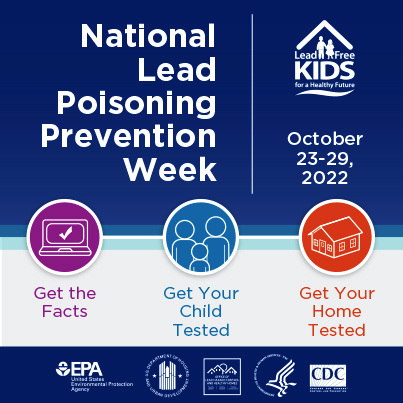![]()

October 23-29 is National Lead Poisoning Prevention Week (NLPPW), intended to raise awareness to reduce children’s exposure to lead and prevent serious harmful health effects, such as developmental delays, difficulty learning, slow growth, behavioral issues, and neurological damage.
According to the Centers for Disease Control and Prevention (CDC), 3.3 million American households with children under 6 years old have lead hazards, including 2.1 million low-income households.
Children in Nebraska remain at risk for exposure to lead. In 2021, 488 children in Nebraska under 6 years old were found to have elevated blood lead levels, which represents 1.5% of children tested for lead.
“Lead poisoning is one of the most preventable environmental diseases affecting young children,” said Dr. Matthew Donahue, State Epidemiologist for DHHS.
Parents, caregivers, healthcare professionals, and communities can reduce the risk of lead poisoning by getting the facts, getting their children tested, and getting their homes tested. A blood test is the best way to determine if a child has been exposed to lead. Follow-up actions and care are dependent on blood lead levels.
The effects of lead exposure may be permanent, but if caught early can prevent further damage to a child’s health. “Recognizing sources of lead in the home and early detection through testing is vital,” said Dr. Donahue.
Lead hazards can be found in a variety of places where children live, learn, and play.
DHHS reports that lead sources can include:
- Chipping or peeling paint in homes or buildings built before 1978
- Soil in and around houses that contain lead-based paint
- Water from lead pipes
- Certain jobs and hobbies
- Some imported foods, spices, and traditional medicines
- Other imported products, like cookware, toys, and jewelry
National Lead Poisoning Prevention Week is a joint effort between federal agencies, community organizations, and state and local government. The goal is to raise local awareness about the danger of lead exposure and poisoning, educate parents and communities on how to reduce exposure to lead in the environment, prevent its serious health effects, and learn about the importance of testing children for lead.
For more information, please check out these free webinars about lead exposure and prevention:
Register to join the Nebraska Methodist College and the Douglas County Health Department webinar on Tuesday, October 25, 2022, from 12:00-1:00 p.m for physicians, nurses, and interdisciplinary health care professionals to learn more about childhood lead exposure and screening. Health professionals can receive free continuing education for participating. Click the link.
Register to join the CDC webinar on Wednesday, October 26, 2022, from 3:00–4:00 p.m. for an engaging webinar, CDC and HRSA Partner for Childhood Lead Poisoning Prevention: Guidance for Clinicians. Click the link.
Register to join the CDC webinar on Thursday, October 27, 2022, from 1:00–2:00 p.m. for an engaging webinar, All Children can be Exposed to Lead: CDC’s Efforts to Promote Awareness and Testing. Click the link.
For more information, please check out the Nebraska DHHS Lead webpage https://dhhs.ne.gov/LEAD or visit the CDC website,
